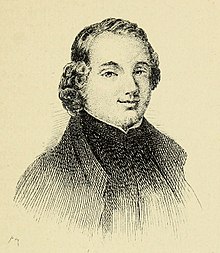Joseph-François Lafitau
| Joseph-François Lafitau | |
|---|---|
 |
|
| Born | May 31, 1681 Bordeaux |
| Died | July 3, 1746 Bordeaux |
| Nationality | French |
| Known for | French Jesuit missionary, ethnologist, naturalist |
| Notable work | Moeurs des Sauvages Amériquains, Comparées aux Moeurs des Premiers Temps, Histoire de Jean de Brienne, Roy de Jérusalem et Empereur de Constantinople, Histoire des découvertes et conquestes des Portugais dans le Nouveau Monde, Mémoire...concernant la précieuse plante du gin-seng |
Joseph-François Lafitau (French: [lafito]; May 31, 1681 – July 3, 1746) was a French Jesuit missionary, ethnologist, and naturalist. He is best known for his use of the comparative method in the field of scientific anthropology, the discovery of ginseng, and his writings on the Iroquois. Lafitau was the first of the Jesuit missionaries in Canada to have a scientific point of view. Francis Parkman praises Lafitau, stating, “none of the old writers are so satisfactory as Lafitau.”
Lafitau was born in Bordeaux on May 31, 1681, and died there on July 3, 1746. Growing up in the port city of Bordeaux, Lafitau gained an interest in the French empire at a young age. Although his father was a wealthy merchant and banker in the citadel of the Huguenot Protestantism, the Lafitau family remained strong Catholics. His younger brother, (1685–1764), followed Lafitau into the Jesuit order and later became the Bishop of Sisteron. Lafitau was able to gain access to books and the opportunity to study and learn many languages as a result of his family’s wealth and resources. He was familiar with important French, Spanish and English voyages, as well as ancient literature, philosophy, theology, geography, and natural history. Lafitau had access to these sources through his education, and this is evident in his writing – in which he frequently makes reference to them. Since the Jesuits offered a path to higher education in France, Lafitau joined the ministry at Bordeaux at fifteen. Following his novitiate, he studied rhetoric and philosophy at Pau between 1699 and 1701. He then taught humanities and rhetoric at Limoges, Saintes and Pau, before returning to his studies at Poitiers and La Fleche from 1706 to 1709. He finished his studies in theology at the College of Louis-le-Grand in Paris in 1710. It was the next year, in April 1711, that Father General Tamburini granted him permission to leave at the end of the year in order to join the Iroquois mission in Canada, where he remained as a missionary for nearly six years.
...
Wikipedia
